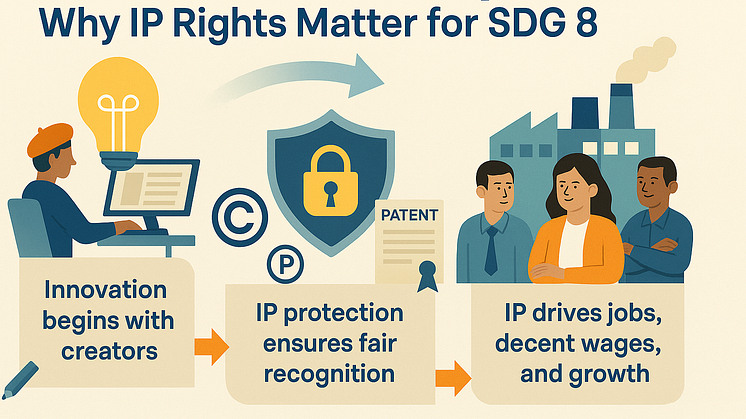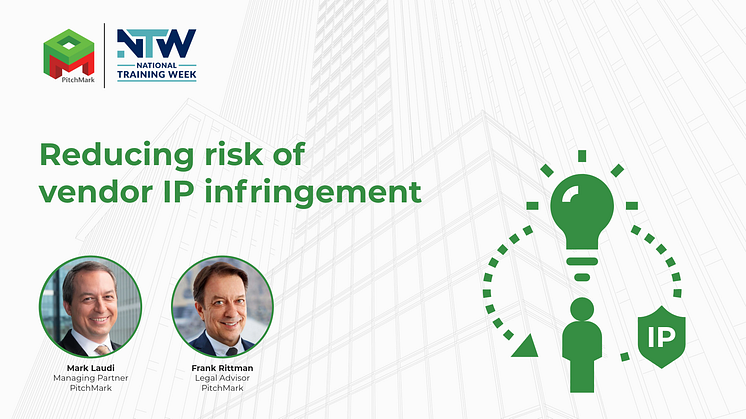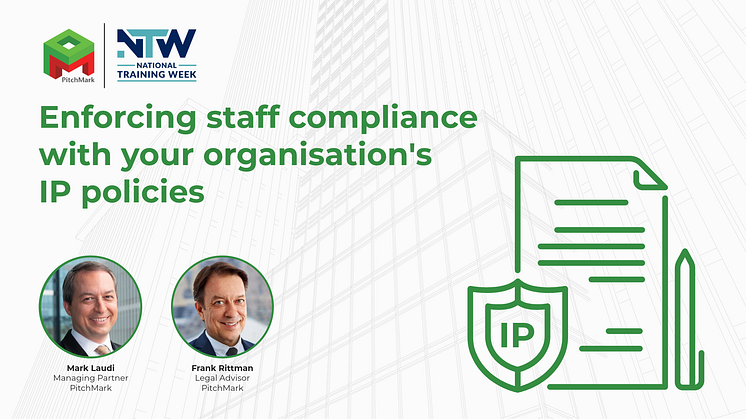
News -
How Respecting Intellectual Property Drives Decent Work and Economic Growth
In today's dynamic global economy, innovation is the cornerstone of sustainable progress. From medical breakthroughs to digital advancements, the ideas that shape our future depend on a framework of trust and fair recognition. At the heart of this framework lies intellectual property (IP), ensuring that creators, inventors, and businesses are justly rewarded for their innovations. For organizations aiming to make a tangible impact under the United Nations’ Sustainable Development Goal (SDG) 8, respecting IP transcends legal compliance—it's a strategic necessity that underpins decent work and inclusive economic growth.
The United Nations’ Sustainable Development Goals Agenda and Intellectual Property
The United Nations' 2030 Agenda for Sustainable Development was adopted by all member states in 2015 as a shared blueprint for peace, prosperity, and sustainability for people and the planet. At its core are 17 SDGs which call for action to end poverty, improve health and education, reduce inequality, and spur economic growth—all while tackling climate change and preserving ecosystems. Countries pledged to align their national policies and investments with these goals, fostering partnerships across governments, civil society, and the private sector to achieve measurable progress by 2030. The agenda reflects an understanding that sustainable development requires holistic, inclusive, and forward-looking solutions—including strong protections for innovation and creative contributions.
While the SDGs are often associated with clean water, fresh air, and environmental preservation, the agenda also emphasizes the importance of building inclusive, knowledge-driven economies. A lesser-known but vital component is the link between intellectual property and sustainability: for ideas to contribute meaningfully to long-term development, they must first be protected. Without IP rights, the incentive to create, share, and invest in new solutions diminishes—undermining the very innovation needed to achieve our shared goals.
Innovation Creates Jobs—When IP is Respected
Most patented invention or copyrighted material represents an ecosystem of skilled labor, with designers, engineers, researchers, and technicians often collaborating to transform ideas into marketable goods and services. According to a 2022 report from the U.S. Patent and Trademark Office, industries that intensively use IP accounted for 41% of U.S. GDP and directly employed over 47 million workers there in 2019. These roles typically offer above-average wages and employment stability.
Conversely, when IP rights are disregarded—through piracy, counterfeiting, or misappropriation—the economic incentives for innovation diminish. Another report, this one from the Office of Economic Co-operation and Development and the European Union Intellectual Property Office in 2021, estimated that international trade in counterfeit and pirated goods amounted more than $464 billion, representing 2.5% of global trade. Such infringements undermine legitimate businesses and jeopardize the livelihoods of countless workers.
The Multiplier Effect for Business and Supply Chains
The cultural and creative industries are significant contributors to the global economy, estimated by various sources to contribute 3.1% to global GDP and employ 6.2% of the world's workforce. Beyond these industries, IP protection fosters confidence among businesses to invest in research and development, establish long-term supplier relationships, and expand into new markets. This confidence catalyzes growth across value chains—from upstream design and manufacturing partners to downstream distributors and service providers.
For Chief Procurement Officers and HR leaders, respecting IP should be integral to good governance practices, reducing risk exposure and ensuring equitable labor practices across sourcing and hiring decisions. For Sustainability Officers and policymakers, respecting IP is not only an economic imperative but also a matter of social equity.
PitchMark is a Singapore-based company businesses and professionals understand, respect, and protect intellectual property rights through practical tools, training, and certification programs that reduce legal and reputational risk, developed specifically for companies and organizations looking to shore up their commitments to the SDG Agenda.[For more information about IP Compliance Certification for your office, look here].
Decent Work Depends on Fair Treatment of Innovation
SDG 8 emphasizes "productive employment and decent work for all." Upholding IP rights advances this goal by ensuring that innovation is not exploitative—that original thinkers, contributors, and creators receive fair compensation. In the digital age, where content can be replicated effortlessly, IP systems are essential in preserving the value of human labor.
In emerging economies, where local innovation drives socioeconomic mobility, robust IP enforcement can mean the difference between viable employment and persistent precarity. For instance, in regions like Sub-Saharan Africa and Southeast Asia, cultural and creative industries have become significant growth engines when supported by enforceable IP frameworks.
IP as a Global Equalizer
One of the most powerful aspects of IP is its potential to level the playing field. A young entrepreneur in Nairobi or a software developer in Bangkok can, with the right protections in place, commercialize their ideas on a global scale. Accessible and transparent IP systems therefore enable entrepreneurs from developing regions to compete on a global scale. The World Intellectual Property Organization reported that small and medium-sized enterprises (SMEs) holding IP rights generate 68% more revenue per employee than those without, underscoring the role of IP in promoting inclusive development and transitioning from resource-based to innovation-led economies.
A Strategic Call to Action
Leaders in procurement, HR, and sustainability should integrate IP due diligence into their environmental, social, and governance frameworks, supplier codes of conduct, and employee education programs. Ethical sourcing must encompass digital content, technology licensing, and branded materials. Respecting intellectual property aligns with SDG 8 – a commitment to decent work, inclusive innovation, and long-term economic resilience.
As Frank Rittman, Legal Advisor for PitchMark® LLC, aptly states "When companies respect intellectual property, they’re not just safeguarding ideas—they’re safeguarding the livelihoods of the people behind them. It’s about enabling people to build livelihoods from their ideas – not watching them get exploited.”
PitchMark trains clients to respect vendors’ intellectual property and build lasting trust, leading the way in responsible procurement. Get PitchMark certified to position your brand as a leader in ethical sourcing and innovation. Visit PitchMark.net and register as a PitchMark client today.



